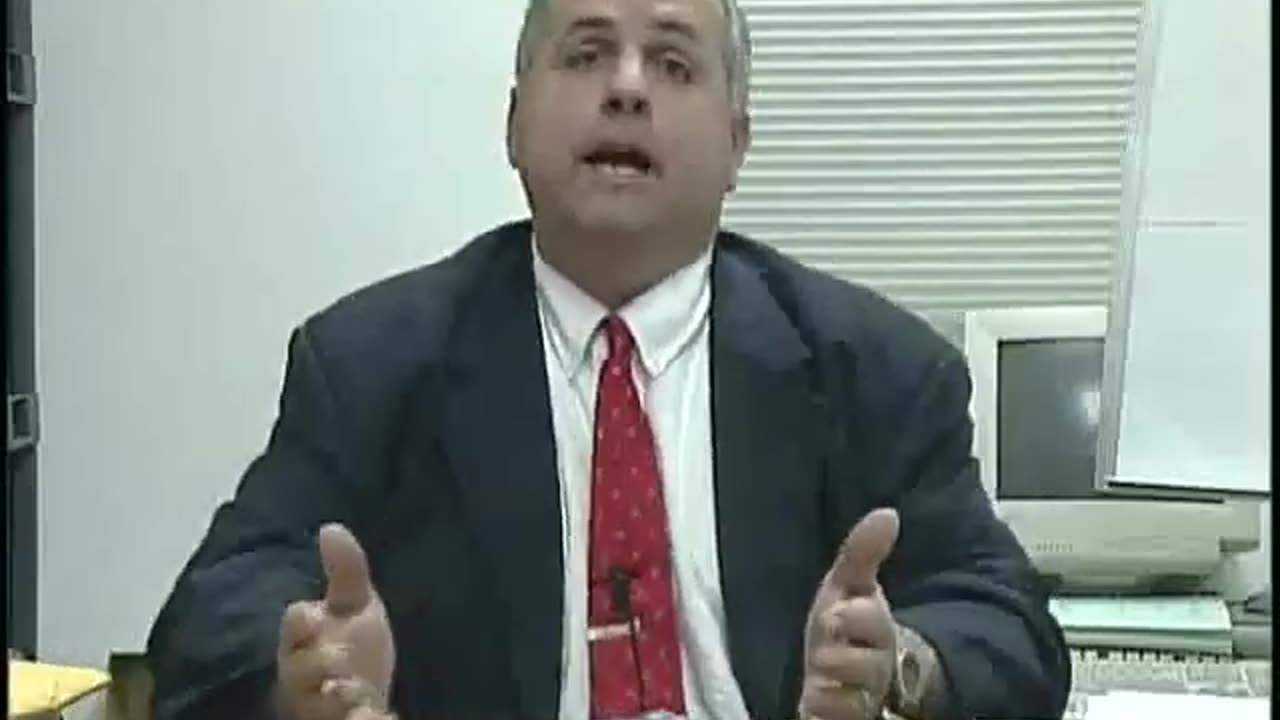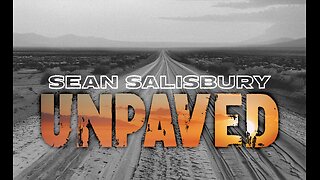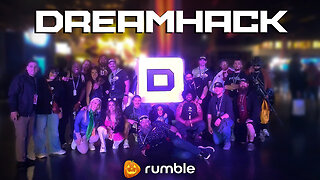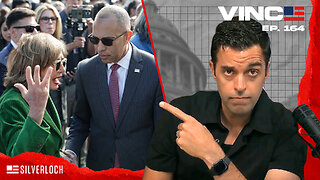Premium Only Content

Hitler's Connection to Zionism, Rothschilds, Israel - What They Haven't Told You: Jim Condit - The Final Solution To Adolf Hitler
Disclosure Regarding Hitler and Zionists: Jim Condit JNR - The Final Solution To Adolf Hitler
Here's a good deep dive into Hitler, his connection to Zionists, the creation of the state of Israel, and more. If you have a dog in this fight, prepare to be disappointed.
SUMMARY:
(00:05) Warburg's alleged financial support to Hitler in 1929 is discussed, suggesting the Nazis had "unlimited money" for their campaigns in 1933, as noted in James Poole's book, "Who Financed Hitler."
(01:58) The narrator mentions a Jewish man who appeared to collaborate with the Nazis during their invasion of Poland, illustrating complex relationships between Jewish people and Nazism.
(02:57) An alleged plan emerged to have both Stalin and Hitler invade Poland to gain Western support against each other, demonstrating a strategic cooperation that led to the onset of World War II.
(04:24) The narrator claims Hitler issued his own currency, undermining the power of international bankers, which led the Rothschilds to realign with Stalin against Hitler.
(06:59) Rudolf Hess's flight to England in 1942 is presented as an attempt to negotiate peace, but he was arrested, representing a message to others about the consequences of revealing the Nazi-Zionist connections.
(25:06) The narrator discusses Lenny Brenner's work, highlighting earlier Zionists' support for fascism and collaboration with Nazis to advance their objectives, particularly concerning the establishment of a Jewish state.
(46:36) The narrative concludes by asserting that both Zionism and Nazism collaborated for mutual benefit, complicating the historical understanding of World War II and the Holocaust.
TRANSCRIPT:
(00:05) interview, he says that in 1929, Warburg was sent from the U.S. to give Hitler ten million dollars, which today might be the equivalent of a hundred million dollars. And interestingly enough, in the book Who Financed Hitler by James Poole, which we'll get to later, I don't know if, let me see if I can grab it here, there we go, Who Financed Hitler, James Poole says that in 1933 campaign, the Nazis had unlimited money.
(00:35) He says how everything was taken care of, they had campaigns all over this Germany, and they just had unlimited money. So this fits in, I mean yes, you could collect some from German businessmen, maybe quite a bit, but when you're talking about unlimited money, like for instance, Clinton had in 96, or Bush had in 2000, there's something more going on here than just ten and twenty dollar donations from businessmen. So that book was written in the late 60s, early 70s, by two people from Cincinnati, Ohio, James and Suzanne Poole.
(01:04) So anyway, to make, the Rakofsky says, look, he's telling in this interview, oh one other thing I wanted to mention, let me just stop here for a second, about Douglas Reed, who wrote this book, The Prisoner of Ottawa. In one of his books, I think it's far and wide, it might be the Zionist Connection, he says, talks about how, this is one of those facts I had in my mind for a decade, or didn't know what to make of it, he was in Poland the day that Hitler invaded and took over.
(01:31) And he says, a guy, a Jewish guy he'd known for years walks in, looked at him, kind of blushed and turned red, and said hi Doug, and walked up to the front of the room. He was Hitler's man in Poland, explaining about how the Nazis took over Poland. And I thought, well how could this Jewish guy be Hitler's spokesman? When you realize that Nazism was a bunch of half-Jews and cooperating with Zionism, now it doesn't become so strange.
(01:58) So anyway, Rakofsky basically says, in this thing, that we were here to overthrow Stalin, but to get himself out of being killed, to get himself out of being killed, he tells Kuzmin, he says, look, here's a plan for Stalin to get all the help he needs, because Stalin wasn't getting cooperation from the United States and other places like he wanted to from that, and he'd got some, but he did not, it wasn't like he needed for how poor Russia was and so forth.
(02:27) He says, here's what you need to do. You get Hitler into a pact, in other words, this was the plan that began World War II. You get Hitler into a pact to invade Poland. Stalin invades the eastern part of Poland, Hitler invades the western part of Poland, and Kuzmin says, well, how is that going to help us? That's going to make both of us odious in the eyes of the West. He says, no, if you do that, the Western papers will all attack Hitler, but they will not attack Stalin,
(02:57) and then we will make the alliances of, you know, there'll be an alliance of England and France and so forth and Russia, and then we'll attack, and then we'll have Hitler where we want him, and he says, this is how you get the cooperation of the West. So Kuzmin says, well, this is all talk, you could just be, so he says, well, look, go see the new ambassador in Russia, Roosevelt's new ambassador, Davis, and bounce this off of him.
(03:20) So Kuzmin goes and finds that Rakovsky's telling him the truth. Rakovsky is transmitting to him what the Rothschilds hope will happen. Stalin needs help. He explains in there that Hitler, before that, he explains that Hitler has become more of a Bonapartist than Stalin. In other words, as mad as they were at Stalin, they were more mad at Hitler, and I don't mean by this presentation to suggest that Hitler did not, was not in large part what he appeared to be.
(03:47) Hitler wanted to be a player. He wanted to be the head of the new order in Europe. He wanted, he felt, according to Radisbon, and I would say that it's plausible that he felt that the half-German, half-Jewish individual was the natural leader, and the Germans, the industry of the German people was the natural leadership of the world. But he did something, and Rakovsky explains what Hitler did that was so bad, from the point of view of the Rothschilds.
(04:24) You may remember that he issued his own money, and this is a whole story in itself. He issued his own money, and Rakovsky says, we don't know how this elemental man found this out. There is an exact progression of how he found it out, but he says, but he issued his own money, which destroyed our power. In other words, he wasn't taking loans anymore from the Rothschilds. He said, we haven't even called attention to this in our press, because we're afraid other nations would
(04:54) notice the formula and develop it themselves, and this would destroy our power. In other words, if they could not issue the money at interest and get the nations in debt, this would destroy their power, and Hitler doing this was far worse than anything Stalin ever did. So they re-teamed up with Stalin, and now Hitler was on the offensive. Now, another thing that needs to be on the defensive once this happened, so Hitler got lured into the
(05:19) Pact. He maybe did it partially because he was afraid of communism and wanted to perhaps get in his pact before he attacked Stalin. Whatever the case was, he fell for it. Both Hitler and Stalin invaded Poland, and then the Western press immediately attacked Hitler mercilessly. Now, this is a very critical thing here. As an aside, the Polish-American Society led by Dana Alvey, Papurek, P-A-P-U-R-E-C dot org, I believe, on the internet, she says that the
(06:01) Nazis and the Communists both did the same thing when they took over Poland. They both killed all of the intelligentsia. So they both acted like a very hostile force to Christianity when they're invading Catholic Poland. So that's just an aside there. So Hitler now realizes something that something has gone wrong, and there's another whole aspect to this thing with the Nazis, and that Hitler had a lot of support in
(06:32) England from the Cliveden Group, which was a lot of Jewish rich people who had become lords and had gotten itself in the English aristocracy. He thought he had an understanding. This explains why he let the English Navy go at Dunkirk, where he had them surrounded, could have easily destroyed them, and he didn't. He did not want a knockdown-dragout war, but when him and Stalin invaded Poland and the Western press only attacked him,
(06:59) Hitler realized that something had gone wrong. This is when Rudolf Hess flew into Europe and flew into England, and the purpose he flew in there in 1942 was to say, what has gone wrong? What went wrong? Is there any way to salvage the deal? And Churchill immediately arrested Hess before he could see anybody, and as you remember, Hess was kept in Spandau prison from 1945 till 1949 for 44 years, and people say, well, why was this done? Well, I'm suggesting we're giving you the
(07:34) reason why this was done. Hess was an example to all the British aristocracy who knew this information. He was an example to anyone in the world who knew this Zionist-Nazi connection and all this background information, that if you speak, you're going to end up dead or you're going to end up like Rudolf Hess in a prison. To make an example of him in Spandau prison, he was there in a prison that held 300 people.
(07:56) He was in a prison that held 300 people, and he was there all alone for 44 years, and every month, one week the United States soldiers marched around Spandau prison, one week the Russians, third week the French, fourth week the British. This was a real message to anyone in the world that you better not reveal what really went on with this part of World War II, or you're going to end up like Rudolf Hess. I've never heard any other explanation for why they kept him in that prison for 44 years with four
(08:25) nations guarding him that even remotely made any sense except for this here. So Hitler realized the deal was off, and then World War II went on. I'll just mention in passing that the Rakofsky interview took place when a strange unknown light appeared from Moscow to Alaska in the exact six hours of that interview, and Catholic sources, many of which myself included, believe that that was the unknown light of Fatima predicted by Sister Lucy.
(08:59) She said there would be a strange... Fatima was an apparition in 1917 witnessed by 70,000 people, whether people want to believe in it or not, that 70,000 people testified to it, including the secular paper in Poland and Portugal called Secula. Sister Lucy said an unknown light will appear in the sky before the next Great War. She said that about 1922 there was a strange unexplained night light that did not fit the Aurea Borealis that appeared exactly at the time that
(09:33) Rakofsky was being interviewed on July 25th, 1938, and during those six hours is when he gave Stalin the idea that grew into World War II 17 months later. Hitler invaded Austria three months later. Incidentally, Rakofsky and one other man's life was spared. The other 24 were killed by Stalin. Now, I want to get now back to the strangest poor thing in Hitler's life. regarding this whole thing. And Rakovsky there gives a lot of insights that you, it's hard to understand what was
(10:05) happening in World War II without knowing what he said and why the sides shifted and all that type of thing. Getting back to Otto Strausser for a minute, prisoner of Otter, one of the things he says in there, he says to Reed that three things in Hitler's history need to be studied. One, his murky origins, two, what he was doing in Munich in 1919 while the communists ruled the city for six months, and three, what happened to him after the war.
(10:37) Because at that time in 1953, everybody, and Reed and Strausser among them, said Hitler was not found in his bunker, that there were no evidence. Now in 1989, Russia released their archives and said he was found, but at that time, and I remember when I was a kid in the 60s, there was no evidence that Hitler disappeared from his bunker. That's another subject we're not going to get into here, but don't have time.
(11:02) But Strausser said that Hitler was in Munich for the six months that the communists ruled Munich. Okay, now, what Strausser said was that in the 20s when Hitler was rising up through the ranks of the Nazi party or was becoming very prominent, he said sometimes over a beer after the meeting, some of the old soldiers or the, you know, the soldiers who had been around for a while and knew about the 1990 campaign, which was only a few years earlier,
(11:34) how the von Epps corps freed Munich from the communists, they said, what was Adolf doing in Munich during the communist occupation? In other words, Adolf Hitler was in Munich for the communist occupation. He said they would usually shrug their shoulders and move on. Strausser was accusing him of working with the communists. Now, and we now have a confirmation of that in a recent history, which we'll get to in
(11:59) just a second. What happened was the communists led, ruled that city for six months, and then the von Epps corps, of which Adolf Strausser was a part, freed Munich from the communists. They were all awarded the von Epps, a cross I believe it was called, the von Epps cross for doing that. Hitler came out and was given some kind of a dispensation, which is covered in some of these books, and he was not looked at as being someone who was prosecuted or anything.
(12:34) But in the recent book by the establishment historian who's appeared on C-SPAN and elsewhere from Great Britain, I think he's from Oxford, it's one of the major universities in England, his name is Ian Kershaw, and he came out with a book called Hitler in 1999. In there he says, and he quotes it with sources, that Hitler was the go-between between the communist leadership of Munich and the soldiers in parts of the barracks.
(13:02) He would get the orders from the communist leaders and go and deliver them to the soldiers in the barracks. And Ian Kershaw says in this history, of course the Hitler history, of course he's an establishment historian, that this part of Hitler's past is very difficult to reconcile with everything else. Well, I'm telling you how to reconcile it here. Hitler was part Jewish, according to all these arrows that we've pointed, that point that
(13:32) direction. He was searching as a young man, what is my place? He thought the communists might take over all of Europe if Stalin's forces arrived. And he was trying to find his place. He didn't. It didn't work out. And he then got involved in the Nazi party. Hitler is one of those individuals, I believe, who could speak with more conviction than those who really believed it. I've met some of these people. If they speak, you feel, gee, this person believes harder than anybody else.
(14:03) You later find out that they really didn't believe in it at all. And I believe Hitler was one of those people, I'm not saying he didn't believe in what he said at all, but I believe his own desire to be a player in the world leadership was more important than anything that he was saying to the people. So that little punchline is another indication that there's a very strange side of Hitler that nobody knows about, that nobody has brought together to this point, let's put it that
(14:35) way. Okay. Now, we are going to go into some other facts about the Zionist-Nazi connection, and then we will be finished here. Okay, now, let me make one general statement here. We're not telling you to disregard all the other histories or all the other things you knew about Hitler and Germany in World War II, but we are saying, without this information we're explaining here, that there's whole pieces that just don't make any sense.
(15:31) You just have to put them out of your mind and say, that doesn't fit, I just can't deal with it, forget it. We're not giving you a way to fit all the pieces together, even though we may not be able to get into, for instance, the Holocaust and so forth, there's sufficient level in this tape. All the pieces fit when you have this piece of Hitler's part-Jewishness, his cooperation in accepting a deal from the international bankers, and what all happened from there.
(15:56) Now, going here to the House of Nazi, which is a book that we got from Interlibrary Loan that is mentioned by Noor Davis in the Star Wars series in the 80s. Sure enough, here's a book that has to do with the House of Nazi, very close incidentally to Nazi, N-A-S-I, of Joseph of Nazi of the 16th century. Believe it or not, one of the things in this book, and this is kind of a book by Jews written for Jews, because it says the publication of this volume by the Jewish Publication Society
(16:26) of America was made possible by the, so on and so forth. Now, what they say in this book is that in the 1550s, 1560s, Joseph of Nazi, who was like the prince of all, must have been a very charismatic guy, the prince of worldwide Jewry at that time, was trying his first, the first transfer agreement, he was trying to find a way to get the Jews back to Palestine, where they had been scattered at the time
(16:52) that the Roman Temple was destroyed in 70 A.D. And what he did is, if my memory serves correct, he made a deal with the ruler of Crete. He made it, with a lot of intrigue, he and his followers pushed a guy to be head of Crete with, the deal was that when this guy became head of Crete, he would persecute the Jews and Joseph of Nazi would have a way for them to get to Palestine, so that they could try to resettle in Palestine.
(17:19) Same thing we're saying happened with Hitler 400 years later. Didn't work that well, they couldn't run modern communications, they couldn't get, move that many people, a lot of things got in the way, christened him with strong men. One of the things in this book, Catholics talk about the victory of Lepanto. At that time, Nazi and them were working with the Moslems to try to break up Christendom, and a great victory in Catholic history is in 1571 in Lepanto, when the Christian forces
(17:46) won a great naval battle against the Moslems. Well, this was Pope St. Pius V was Pope then, it was a great victory, and this book it says that the leaders of the Jews then, Joseph of Nazi, talk about the unmitigated disaster of Lepanto, so they were hoping that the Moslem forces would break up Christendom to help give the Jews more influence in Europe, didn't work out that way, but that's some of the stuff in this book.
(18:11) The reason I bring it up, you can get the whole book for anything, I'm giving you these sources so you can check these things for yourselves, rather than just believe my quick few sentence synopsis of it, and I'm not saying it's impossible, I have a shading or an emphasis wrong here or there, we're trying to lead people into legitimate research here. The House of Nazi is a book that talks about this first attempt at a transfer agreement
(18:39) and working with a leader who would persecute the everyday Jews to try to scare them out of a place and get them down back to Palestine. Okay, now, let's move from there to the modern transfer agreement. We put this up, I don't have this book, this book is easily available on Amazon, it's again by Edwin Black. This is the modern transfer agreement, we explained it already, where there was a deal between Zionist company in Palestine at that time, Habra, and the Nazis to ship German
(19:21) goods through the Zionists so they could make a profit, they made tens of millions that way towards the preparation of the takeover of Palestine. I contend this had to be the fulfillment of the deal that Hitler took for accepting the funding. Whether Hitler planned to overthrow the Rothschilds or not eventually, maybe he did, we're just saying this explains what happened. So that was a very important transfer agreement, big book here, it's about 400 pages, and very
(19:48) important reading. I think he says that 60,000 Jews were transferred in the 30s from Germany and Europe down to Palestine. Okay, another book. Ben Hecht. Ben Hecht was a Hollywood writer. He was the assistant to David O. Selznick on the movie Gone with the Wind. Ben Hecht, if you ever see the movie From Here to Eternity, his name appears on the screen near the beginning of the movie, as big as the screen itself, as the screenwriter.
(20:27) He's a very brilliant writer. This book is a very intriguing book. I don't agree with his position, but he was a committed Zionist, a Hollywood producer and writer, screenwriter, raising money to help the Ergun, which was like the front force freedom fighters or terrorists, whichever side you're on, of the founding of Israel. And this whole book Ben Hecht has here is a book about a Hungarian Jew who put out a few mimeograph pamphlets about a Jew named Katzner who had cooperated with the Nazis and betrayed hundreds of thousands of Jews into concentration camps.
(21:04) And Greenwald was so mad about it, he was a man in his 70s or 80s, that he was trying through this little xerox or mimeograph method in a few cafes and market squares that passes out in Israel, where the Israeli government overreacted and sued him for libel. And it looked like he was going to be railroaded, but he got one of these Ergun, former Ergun lawyers who had seen Ben-Gurion and seen the leaders of Israel betray the frontline people over and over again. He became his lawyer.
(21:33) Make a long story short, this was big news in Israel in the mid-50s, didn't make it to the rest of the world. The Ergun lawyer traps Katzner on the stand, proves he collaborated with the Nazis, and then Katzner was assassinated by a mugger a few weeks later to get him out of the way. He was the Secretary of State of Israel at that point. Make a long story short, this is a tale. This book explains the top Zionists preventing people from helping the everyday Jews in these countries. After the war, of course, when people were in all these concentration camps or post-concentration camps, the Zionists were all there trying to get them down to Israel.
(22:12) But there was deals made, and the Nazis and the Zionists were working together. That's what this book shows. Ben Hecht says in here, he says, look, I thought when we had our own country, we would be much better than all the other countries. He says, in effect, Ben-Gurion and our leaders have been worse than the leaders of the other countries. The book was written in 1961, and it went out of print for a while, but it's back in print now. I'm sure they ran it out of print as fast as they could before the modern era of late 1990s and the internet and on-demand printing. It's just hard to keep in Xeroxing, where you can hardly keep anything from being printed, and nobody can keep anything from being printed.
(22:47) But Ben Hecht, in effect, at the end of this book just basically says, what is going on? And I'm telling you, what's going on is Nazism and Zionism were two sides of the same coin, one run by committed Jews, the other run by half Jews. Now, there's an interesting, well, let's move on from that, because that's basically what you need to know about perfidy for right now. The next thing we're going to talk about is Lenny Brenner's book. This man is still alive. He's in New York City. The name of his book is Zionism in the Age of the Dictators. And boy, I don't have the right – I have this in better form than this, but there you go. Zionism in the Age of the Dictators. This is on the internet at CODOH, C-O-D-O-H dot com. The whole book's on the internet, or you can now get a copy again.
(23:37) And Brenner's written a few books. We're going to mention one other before we quit here. Zionism, Revisionism – excuse me, Revisionism and Nazism is chapter 11. And here's an interesting thing. He gets into why some of the Jews, the Zionists at that time, the top – we're always talking about the top leaders here – supported Hitler and started the fascist movements in Italy and supported Hitler. And he says what happened was – and many of you watching will know about the Balfour Agreement at the end of World War I where when England was going to lose to Germany and was looking like they were definitely going to lose, the top Zionists came to the English and said, look, we will bring America into the war on your side in 1970, but you've got to promise to help us get Palestine after the war because we want to resettle Jews in Palestine, have a state there.
(24:33) And Lord Balfour said, yeah, we'll do that and issued the Balfour Declaration. Well, by the 30s, a lot – in the late 20s, a lot of these Jewish leaders like Menachem Begin who became later Prime Minister of Israel said, hey, we don't believe the English are ever going to give us Palestine. We've got to do something to break up their empire, break up their power. These individuals, the Zionist revisionists, then helped Mussolini found his fascism, helped – were supporting Hitler and working with Adolf Eichmann and so on and so forth, and he goes into this at great length.
(25:06) And a lot of this book – he, again, is from like a socialist Jewish background, at least his parents were, and he's – like so many of the authors that have written about this, they're just furious the way that their parents and so forth were treated by the Nazis who were fighting the communists. And so it was like two – I say it was an internecine feud, but that book is very important on many fronts. Now, Brenner – let's see. I want to mention something else about Brenner there.
(25:37) Lenny Brenner talked – let's see. I lost my train of thought here. Okay, well, let's move on to – hopefully I'll come back to that. The Secret World Government is another book written in the 1920s by Count – Major General Count Shirop Spiridovich. He was a Russian who came to the United States after the communists took over. He in there talks about the continuity of taking the government further away from the people, from Bismarck to Hitler. And one of the things that was happening – there were several things happening after World War I that had the top Jews very worried.
(26:18) One was Henry Ford's book, The International Jew, which I have in the other room but didn't bring it here. You can find that, I'm sure, in many places now. The International Jew by Henry Ford was being translated into many languages and spread across Europe and the world and America because the Jewish hand in the communist revolution was so noticeable. Also, there was a movement between Alsace-Lorraine, France, and Bavaria of Germany to unite and have kind of a Catholic power in Central Europe. Hitler was arrested for one time, a man who was advocating this unity of the Catholic states. He went up and punched the guy in the face and spent some time in prison because Hitler was backing – was in this movement of primarily Jewish-backed movement, as Spiridovich had said.
(27:06) All the Jews that were around Bismarck – and others have said this too, it was in one of the other books we referred to earlier – and the other leaders, Wilhelm, all the Jewish advisors, all the German constitutions, trying to get this centralized government of all the Germanic people. Hitler realized that that Catholic renaissance around the Habsburg dynasty would have derailed this, so in 1920 or so, or 1923, he ran up and hit somebody in the face during a big hall meeting who was advocating this, and some of that is recounted, that type of history is recounted in this book, The Hidden Hand by Count Sheriff Spiridovich.
(27:45) We already mentioned, as far as Hitler's funding, let me again remind you, Who Financed Hitler, and then another book by another great researcher, Wall Street and the Rise of Hitler by Anthony Sutton. Anthony Sutton also passed away recently, but here you'll find a lot of the American firms and the companies that were helping the Nazis do their job, and this is very solid documentation. This book is actually condensed from a much longer research that Sutton did.
(28:38) The War Against the Jews by Lucy Davidovich. In here, she documents that many of the Jewish leaders in America were wanting to establish the Palestinian state so badly, the Jewish state in Palestine, that they did not intervene. They claimed the Vatican didn't intervene. They didn't intervene at all to help a lot of the Jews who were being rounded up by the Nazis, which again I say is two sides of the same coin, because they wanted the persecution so they could prove that they needed the Jewish state.
(29:18) They wanted to prove persecution. She documents that Wise and Rabbi Wise and a lot of other prominent Jews in Congress and elsewhere did not help. Another book is the, here's a very important pamphlet about how the Jews were backing fascism and Nazism. This is called The Jews of Italy, and it's put out by the B'nai B'rith, and it's put out in 1938, and I'm trying to find that here. Well, there it is.
(30:00) 1937 there, but the notes here, if we find the right place in the book, it's 1938, it's put out by the Anti-Defamation League of B'nai B'rith, Jews of Italy, 1938, and what it says in here is how the Zionists had to explain to Mussolini what his job was to be, and Mussolini and Adolf Eichmann, listen to this now, Mussolini and Adolf Eichmann set up training camps for the Urgen in Italy and in many of Hitler's occupied territories.
(30:28) Adolf Eichmann spoke Yiddish, Cardell accuses him and states in Adolf Hitler Founder of Israel, which book we referred to earlier, that Eichmann was hiding that he was a full-blooded Jew, that he spoke Yiddish, that he went down to Palestine many times, he set up training camps for the Urgen, and this was all done under Hitler's regime, surely with Hitler's knowledge. How do we explain if Hitler was what we're told he was, that he's setting up training camps
(31:04) to help the Urgen train so that they can eventually take over Palestine? So this is a very hard to find, little-known pamphlet. Here's another book, can't get away without mentioning this one, you can find it on Amazon, Special Treatment, the Untold Story of Hitler's Third Race. This is a review of it by the Institute for Historical Review, it was written by a fellow named, excuse me, I have to look at it here, written by a fellow named Alan Abrams, and this is
(31:36) about all of the half-Jews that Hitler classified as Germans, that Hitler and the Nazis classified as Germans. Either in the review or in the book, somebody says, I think it was in the book, the guy in confusion says, gee, if Hitler hadn't protected all these half-Jews, all the Jews might have been wiped out, something to that effect. The guy obviously didn't understand what was going on.
(31:57) Hitler, I'm asserting here, felt that the half-Jews and half-Germans were the natural leaders of mankind and the industry of the German people filled out the leadership of mankind and that he would be the leader of it all. So, very important book there. Probably most people have not heard of that. Criminal Politics did three articles, that's an article, a magazine put out by L.T. Patterson. He had three issues, this one from March 1998, Zionist-Nazi collaboration by Eustace Mullins, all of those are very Zionist-Nazi collaboration
(32:33) from February 1998, and he had another magazine, all very interesting information in there, take too long to go into here. For this whole period and the struggle for world power, we might want to use the term globalist Zionist, which was given to me to explain these people who were collaborating with the top Nazis. A book to get, I don't know if I can put my hands on it here, but it's called The Controversy of Zion.
(32:59) Do I have it? I don't know, but you can remember the title, hopefully. Let's see if it's down here. Okay, The Controversy of Zion. It's here, but I can't find it. It's written by Douglas Reed, and that gives you a lot of the history, that gives you a lot of history of that period. The Abandonment of the Jews, can I find that? By David Wyman, another book, The Abandonment of the Jews, another book that brings out the incredible way that the powerful Jews in America wanted
(33:45) a Palestinian state so bad that they allowed the Nazi roundup of the Jews to occur in many countries and the persecution. That made the reason why we have to have a Jewish state. They point out how they could have intervened at many points, and they didn't. This is where the revisionists, some of which who want to say that almost no Jews were killed by Hitler or were not rounded up or persecuted, is just not correct. It's just not correct.
(34:13) It goes too far, although the Jews in Hollywood and Steven Spielberg in their depiction of what happened in the Holocaust also goes far. Maybe I'll have a little chance to address that near the end of this, which will be very soon. Dr. John Coleman, you can buy it from him, The Life and Death of Rudolf Hess. That's something else that I'll refer to. That gets to all these connections Hitler had with England.
(34:37) Remember we talked about how the Jews were backing, the top Jews were backing Bismarck to Hitler, centralize the government of Germany, get rid of the religious unification, just make it a Germanic unification. There's several books, one by Nesta Webster that in effect talk about the German Bolshevik Conspiracy. Nesta Webster might have written. Is this what she wrote? I don't even know if this is hers or not.
(35:04) But there's a number of books about how there was a lot of kibitzing, if you will, between German leaders and Jewish leaders leading up to the time of Hitler. Okay, that's another piece of documentation that we do not want to miss here. And Jim Mars, this is on the site www.thebirdman.com. Selected quotes from Jim Mars' book Rule by Secrecy. So you get to get his book Rule by Secrecy. He brings it out there, Russian Jew, Alfred Rosenberg, you may have heard of, and the important part he played in farming
(35:55) Hitler's thinking regarding how to rise to power and so on and so forth. New book out, and gee, if I have it, I know I have a page on it here, but I don't know if I can find it. There's a new book, quickly now, but there's a new book out called 51 Documents, Zionist Collaboration with the Nazis. That's by Lenny Brenner. 51 Documents, Zionist Collaboration with the Nazis. So I don't think I have it here, but it's on Amazon.
(36:28) I'll just repeat the title again. 51 Documents, Zionist Collaboration with the Nazis. Okay, so I did just find what I told you I couldn't find. There it is, 51 Documents, Zionist Collaboration with the Nazis by Lenny Brenner. And here's what the book description is. I'm going to read it because it's a good beginning of an ending here. The Nazi era is the most discussed period in history, yet most Jews and other Americans are unaware of the interaction between Zionism
(37:05) and Hitler and Mussolini. The reason is simple and stark. Now remember, Lenny Brenner is himself a Jewish person who is for the Jewish people. The reason is simple and stark. The Zionist record is dishonorable. This book brings to light, and again he's talking about the top Zionists, or maybe many Zionists who are everyday people who are horrified by this information we're talking about here. I'm sure there are.
(37:27) This book brings to light, through the use of actual historical documents, the disservice that the Zionists did to Jews before and during the Holocaust. Some of these documents were published in English decades ago, but are only now seeing the light of day. Others are being translated into English for the first time. Included are documents from propaganda minister Goebbels' newspaper Der Angriff, detailing an SS man's visit to Palestine as the Zionist guest.
(37:52) Readers will also learn about Adolf Eichmann's account of his personal dealings with the Hungarian Zionist Rezno Katzner. That's the guy in perfidy by Ben Hackt, who was fingered by the old Jewish guy Martin Grunwald and was found guilty and then assassinated, who was the Secretary of State of Israel in the 50s. Anyway, Eichmann was cooperating with Rezno Katzner, who was later assassinated in Israel as a Nazi collaborator who betrayed 400,000 Hungarian Jews.
(38:21) Also revealed is pro-Zionist propaganda put out by the Nazis, such as a medal for getting Jews to Palestine and a Nazi board game where the object is to move Jews to Palestine. The documents contained in this book were selected with due care so that a rounded picture of history emerges. The author concludes that Zionism betrayed the Jews and the evidence that led him to that conclusion is contained in this book.
(38:47) This book shows that the consequences of Zionism demand exposure about the author. Lenny Brenner has authored three critically acclaimed books on Jewish history, Zionism in the Age of the Dictators, which we've shown you, The Iron Wall, Zionist Revisionism, From Jablonski to Shamir, and Jews in America Today. He currently resides in New York City and I even gave his email address here somewhere. Let me start to come to a conclusion.
(39:15) Why I think this is so critical, why I think this is so critical, this information, is because the top Zionist Jews are now using the Holocaust as a brick bat against humanity to accomplish all sorts of things. One is I think the United States has given Israel over $100 billion. Germany has given Israel over $50 billion. What I will suggest to you very strongly based on this evidence is that just as the average Jewish people in Europe had nothing to do with their rounding up, the killing
(39:52) of many of them, the starvation and the disease that happened near the end of World War II and so forth. The average German, the average Pole, the average Christian in Europe had nothing to do with the plans for the Holocaust. It was financed, thought of, organized by the top international bankers of both Jewish and non-Jewish. Many of you have probably heard of George W.
(40:17) Bush's grandfather, or I think it was grandfather Prescott Bush, who was involved in helping to finance and help Hitler up the line. That's in Anthony Sutton's work, I believe. So the point is that the average German and so forth had nothing to do with planning the whole World War II scenario and the so-called Holocaust. I want to talk a little bit about the Holocaust here. What is important to keep in mind here, there may have been many Germans or Poles that got in with guarding the camps or something
(40:55) to try to rise or to go along with the program for their own benefit, but that is not the same as a whole population demanding this happen. Now, the Holocaust, I have to mention briefly here, I look at everything from a theological point of view, and I'm going to put up here another book by Father Dennis Fahy. One of my friends said to me, the Jewish issue discussing these things can be very dangerous for people that don't have a supernatural outlook.
(41:23) So may I strongly recommend that as you delve into these things, you get one of the books by Father Fahy, such as The Kingship of Christ and the Conversion of the Jewish Nation. Fahy is F-A-H-E-Y, and he gives a proper outlook on all these things. I believe, though, that the Hollywood run, as you can find out in Neil Gabler's book, An Empire of Their Own, founded and run by secularist Jews, they're trying to replace the crucifixion of Christ as the central event in history with the Holocaust, the crucifixion of the Jewish race.
(42:01) Unfortunately, a lot of the facts of the Holocaust, quote-unquote facts, don't hold up. For instance, if anyone wants to come away not believing in gas chambers, and I know that's radical thought for many people, go on the Internet, punch in Google, David Cole Auschwitz, and I think you'll find on Kodo a one-hour video you can watch if you have a real player or some other Windows player or something. The young Jewish guy, David Cole, who was on Phil Donahue with revisionist Bradley Smith in the early 90s, went to Auschwitz.
(42:35) Asked questions for an hour, and I don't know how anyone can believe that there were gas chambers at Auschwitz after looking at that video. The numbers killed at Auschwitz have been reduced in the last 20 years from 4 million to 1 million. There were Jews rounded up, definitely by Hitler. We've told you why. Many were persecuted. David Irving says there were some massacres. But the camps were primarily meant to be a transfer point for Jews to the Middle East,
(43:08) although many Jews were apparently figured to be let die there also. I don't want to minimize that. There were many suffering. These people who say their grandfather, there is an awful lot of survivors, more than one would think, and there's a book out about that now by a Jewish individual named Norman Finkelstein called The Holocaust Industry. I don't know if I can grab it here. The Holocaust Industry by Norman Finkelstein, who at the end has his own mother saying,
(43:34) this came out in the last few years, and I think Finkelstein lost his position at New York City University. He has his mother at the end saying, if everyone who says they are a survivor is, who did Hitler kill? He's making the point of there's so many survivors who are all in excellent health over the last decades. But the point is that while there was Jews killed, there is many problems with the Holocaust story.
(44:01) Hutton Gibson, the father of Mel Gibson, in a recent New York Times magazine article, pointed out the absurdity that six million Jews were incinerated in World War II. Of course, that's creating a big controversy. But that was a few weeks ago, sometime in March of 2003 or maybe late February, in a Sunday edition of the New York Times magazine. According to this interview, his wife chimed in, his first wife died, this is his second marriage,
(44:33) as it explains in the article, or one of the subsequent articles, said, well, there weren't even six million Jews in Europe at that time, which is also true. So there's many, many problems with the Holocaust story. The word, Michael Hoffman tells us in one of his tapes, the word Holocaust didn't even appear in the dictionary as a capital H until 1980. The Holocaust movie series of 1977 is when the current propaganda that we're facing got started.
(45:02) And today in public schools, almost everything they read has either to do with the Holocaust or slavery. So we want historical accuracy. We want to refute that all of the white Christian people, descendants of the white Christian nations of Europe, need to walk around with a guilt complex for the next, from now till eternity, because this just does not fit the facts. What you have is super criminals on all sides, the Rothschilds and the Schiffs and the Rockefellers
(45:34) and the bankers at the top, and Stalin in Russia, Hitler in Germany, Churchill in England, Roosevelt in the United States, all in my mind, super criminals, working together, Zionism and Nazism working together in a way that shocks most people. And this is the real side of World War II that puts it all together. And that is the purpose that we tried to bring out in these last few hours with all this documentation.
(46:02) Hitler's motives, he may have wanted to, he may have, I'm sure he was, many of his attitudes he expressed of revulsion against the practicing Jews and the Jews, many of whom were pushing pornography in Germany then, as they are in America now. I'm sure those were, they seem to me that those were very sincere convictions of his. But there's more to Hitler than meets the eye. He was amoral, a man who did things that could not be reconciled with a moral man by anybody's standards.
(46:36) So at any rate, we'll end by how we started here. We don't know who will be madder at this tape. The B'nai B'rith who want you to believe that the Nazis and Hitler were out to kill every Jew in the world, which I think we've demonstrably proved is absolutely false, or the Aryan nations who want you to believe that Hitler should be looked at as a kind of demigod and to be emulated. I think we've absolutely disproved that, not that the world needed that to be disproved,
(47:03) but we've again disproved that here, that that's absolutely false. So we thank you for watching, and we hope that there will be a much more exhaustive documentation of this subject brought out someday. Thank you very much.
-
 24:14
24:14
Verified Investing
2 days agoBiggest Trade As AI Bubble Begins To Burst, Bitcoin Flushes Through 100K And Gold Set To Fall
1.7K -
 1:12:28
1:12:28
Sean Unpaved
2 hours agoAB's Dubai Drama: Extradited & Exposed + NFL Week 10 Locks & CFB Week 11 Upsets
10.7K -
 2:06:08
2:06:08
The Culture War with Tim Pool
4 hours agoDemocrats Elect Man Who Wants To Kill Conservatives, Time For An Exorcism | The Culture War Podcast
109K91 -
 1:36:52
1:36:52
Steven Crowder
5 hours agoMamdani's Anti-White Victory Must Be America's Wake Up Call
273K320 -
 2:18:38
2:18:38
Side Scrollers Podcast
4 hours agoGTA 6 GETS WRECKED AFTER ANOTHER DELAY + India THREATENS YouTuber Over Video + More | Side Scrollers
20.9K4 -
 1:00:20
1:00:20
Simply Bitcoin
6 hours ago $0.07 earnedThe Bitcoin Crucible w/ Alex Stanczyk ft Tomer Strolight - Episode 7
35.7K1 -
 17:33
17:33
a12cat34dog
6 hours agoRUMBLE TAKEOVER @ DREAMHACK | VLOG | {HALLOWEEN 2025}
29.3K22 -
 LIVE
LIVE
Spartan
3 hours agoStellar Blade Hard Mode with death counter (First Playthrough)
38 watching -
 1:02:11
1:02:11
VINCE
6 hours agoPelosi Is Passing The Torch - Who's Next? | Episode 164 - 11/07/25 VINCE
198K184 -
 DVR
DVR
GloryJean
5 hours agoWINNING All Day Long Baby 😎
22.5K1